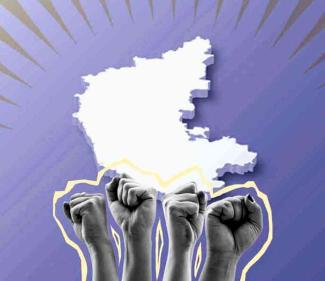Ahead of the crucial 2024 Lok Sabha elections, six more Assembly elections are scheduled to be held this year beginning with the elections to the Karnataka Assembly on the 10th of May. Over the last couple of decades, Karnataka has evolved as a key laboratory for the southern expedition of the fascist brigade. Empowered by the ascent of the Modi regime at the Centre in 2014, the fascist forces made their intent clear with the assassination of the renowned rationalist thinker MM Kalburgi and activist journalist Gauri Lankesh. Even though the BJP did emerge as the largest single party in the 2018 elections, Karnataka had a coalition government headed by the INC and JD(S). But with Modi back in power for his second term, the state government was toppled by engineering defection bringing the BJP back to power. And during the last four years with a BJP government in power, headed first by BS Yediyurappa and then by Basavaraj Bommai, Karnataka has seen the worst of times marked by rampant corruption, spiralling atrocities on Dalits and Adivasis and unbridled hate and violence against Muslims.
Today as the Modi government is confronted with tough questions on every front, it has only one answer: an arrogant silence accompanied by brazen persecution. When the BBC videos reminded us of the horror of the 2002 Gujarat pogrom which had “all the hallmarks of ethnic cleansing” and told us about the British High Commission report which found Narendra Modi as then Gujarat CM directly responsible, the answer was a ban on screening or sharing the videos and a tax raid on BBC offices in Delhi and Mumbai. When the Hindenburg report exposed Adani’s monumental corporate fraud and the opposition demanded a probe into the scam by a Joint Parliamentary Committee and Rahul Gandhi put the spotlight on the Modi-Adani nexus, the answer was disruption of the entire parliamentary session by BJP MPs and disqualification of Rahul Gandhi’s Lok Sabha membership.
Arvind Kejriwal wanted to see the degree of Narendra Modi as claimed in his election affidavit and the answer has been a fine of Rs 25,000 and CBI summons for Delhi CM in the alleged liquor scam in connection with which Deputy CM Manish Sisodia is already in jail. One certainly does not agree with the AAP insistence that the PM, or any politician holding high office for that matter, must have high level educational degrees. The issue here is not how highly educated the PM is, but the veracity of the affidavit filed by him as an election candidate. While common citizens are constantly being asked to furnish their personal identification details to access almost every public service and right, and undocumented citizens are threatened with the loss of their very citizenship, the PM certainly cannot have any special right to hide his degree as a matter of privacy. Also, the so-called degree of the PM that was shown by Amit Shah in a press conference has been exposed to be full of anomalies.
Perhaps the most explosive question about the PM has been raised by Satya Pal Malik, the Governor of Jammu and Kashmir during the crucial period of 2019 when the Pulwama massacre happened, Article 370 was abrogated and the state was demoted and divided into two Union Territories. Satya Pal Malik has squarely blamed the Prime Minister and his senior cabinet colleagues for the huge security lapse and intelligence failure that cost the CRPF the Pulwama massacre. The CRPF had asked for aircrafts to ferry its jawans, but the Modi government turned it down. No steps were taken to secure the roads either which could have stopped the explosive-laden vehicle from intercepting the CRPF convoy and triggering the massive explosion that claimed the lives of forty soldiers. The PM was then busy with the Corbett Park shooting with the Discovery channel and when he spoke to the Governor after the shooting, according to Malik, the PM asked him to keep quiet about the security lapse. The same ‘keep quiet’ message was also communicated by NSA Ajit Doval. In his interviews, Malik has also accused RSS and BJP of promoting corruption with specific references. Weeks after the interview, the regime still maintains an eloquent silence about the allegations.
The continuing centralisation of power driven by an aggressive unilateralism of the executive has begun to pose an existential crisis to the constitutional foundation of democracy. The executive is openly instigating the people against the judiciary, with the law minister even describing retired Supreme Court judges critical of the regime as an anti-national gang. Of late we have seen a few encouraging signs of the judiciary trying to check and correct the trend of executive abuse of power. For example, the Supreme Court has asked the government to renew the licence of a Malayalam TV channel that had been revoked by the Union Home Ministry. The court has also asked the Gujarat government to explain its act of releasing the convicts who were sentenced to life imprisonment in the Bilkis Bano case.
May 10, 1857 had marked the beginning of India’s first war of independence. A popular uprising made possible by extensive Hindu-Muslim unity had shaken the foundations of the British East India Company’s Empire. One hundred and sixty-six years later, modern India finds itself in the middle of an equally decisive battle. Let the people of Karnataka give a fitting rebuff to the fascist forces who are trying to rule India much like the colonial power did – by suppressing the Indian people, denying them their basic human rights and pitting Hindus and Muslims against each other to facilitate the plunder of their land and resources. May 10, 1857 had unfurled the banner of freedom from foreign rule. Let May 10, 2023 sound the bugle of freedom from fascism to liberate India from the lethal combination of communal hate and corporate loot.










